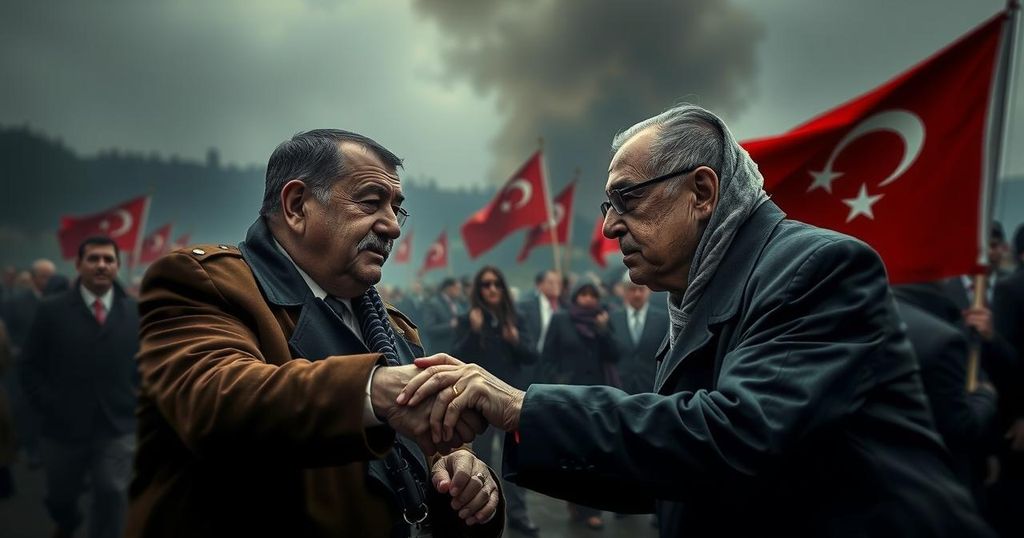Turkey’s Diplomatic Shift Towards Kurdish Relations Post-Attack
Turkey is seeking to improve relations with the Kurdish community following a PKK-claimed attack that left five dead. This comes amid surprising gestures towards jailed PKK leader Abdullah Ocalan, with government officials advocating for peace despite ongoing military responses to Kurdish militants. The shift reflects the influence of regional conflicts on Turkey’s domestic policies and the complexities of engaging in dialogue with the historically adversarial Kurdish movement.
In a notable shift, Turkey is attempting to improve relations with the Kurdish community following a recent deadly attack attributed to the Kurdistan Workers’ Party (PKK). The attack occurred at the headquarters of the state-run TAI company, resulting in five fatalities and two dozen injuries. It took place shortly after Turkish nationalist leader Devlet Bahceli extended an unexpected olive branch to Abdullah Ocalan, the imprisoned PKK leader. Bahceli suggested allowing Ocalan to address the Turkish parliament to denounce violence and advocate for the dissolution of the PKK, which has been engaged in a violent insurgency against the Turkish government for decades. Despite this overture, the PKK asserted on its Telegram channel that the recent bombing was unrelated to Turkey’s diplomatic gestures, claiming it was a pre-planned action intended as a warning against state oppression. Concurrently, the Turkish military retaliated by targeting Kurdish positions in northern Iraq and Syria, following a long-standing pattern of military response to PKK actions. Hamit Bozarslan, a Paris-based expert on Kurdish issues, suggested that Turkey’s changing stance is influenced by the volatile regional dynamics, especially concerning the political landscape in neighboring Iraq and Syria. He indicated that the Turkish government may seek dialogue with the Kurdish movement in response to declining Iranian influence amid the ongoing regional conflicts. Furthermore, the PKK has consistently been classified as a terrorist organization by Turkey and its Western allies, which complicates the potential for any reconciliation. Just hours prior to the attack, Ocalan received his first family visit in three years, with implications regarding his authority within the Kurdish movement now being questioned. Observers emphasize that Ocalan’s ability to facilitate a political resolution may be hampered by his lengthy imprisonment and the absence of recent communications with PKK leadership. Public sentiment in Turkey appears to be skeptical regarding partnerships with the PKK, with many interpreting the government’s outreach to the Kurdish community as a strategic measure stemming from fears of escalating regional conflicts prompted by the Israel-Hamas war. Analysts argue that these initiatives may be an effort to consolidate national unity in the face of external pressures, particularly concerning Turkey’s borders with Syria, which is allied with Iran. Additionally, Turkey condemned Israeli airstrikes on Iran, framing them as a threat to regional stability.
The PKK has been locked in a violent struggle with the Turkish state since the mid-1980s, resulting in thousands of deaths and significant turmoil in the region. Following numerous failed peace attempts, Abdullah Ocalan’s imprisonment since 1999 has left unclear the future of negotiations. The complex interplay of regional power dynamics, particularly involving Iran, Iraq, and Syria, continues to impact Turkey’s approach to its Kurdish population. The recent escalation of violence and diplomatic initiatives highlight Turkey’s effort to navigate these intricate relationships while addressing its internal ethnic tensions.
In conclusion, Turkey’s efforts to engage with the Kurdish population represent a significant, albeit complicated, shift in policy amidst regional instability and continuous PKK violence. The implications of Ocalan’s influence, coupled with the Turkish government’s motivations driven by external conflicts, underscore the challenges of achieving lasting reconciliation with the Kurds. The observed changes suggest a strategic recalibration as Turkey confronts broader geopolitical concerns.
Original Source: www.iraqinews.com




Post Comment